|
|
|
Sort Order |
|
|
|
Items / Page
|
|
|
|
|
|
|
| Srl | Item |
| 1 |
ID:
095273
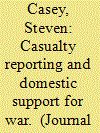

|
|
|
|
|
| Publication |
2010.
|
| Summary/Abstract |
The common argument that public support for war is casualty sensitive ignores the fact that casualty figures are not revealed automatically. While the military decides when, and to whom, to release such information, political elites can question, even condemn, how the government goes about this business. After briefly exploring how the US military operated during the two world wars, this article focuses on American casualty reporting during the Korean War, arguing that the way the figures were revealed often sparked enormous political controversy, which at two crucial moments helped to undermine domestic support for this distant war.
|
|
|
|
|
|
|
|
|
|
|
|
|
|
|
|
| 2 |
ID:
149475
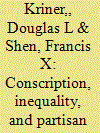

|
|
|
|
|
| Summary/Abstract |
While recent scholarship suggests that conscription decreases support for military action, we argue that its effect is contingent both on a draft’s consequences for inequality in military sacrifice and on partisanship. In an experiment examining public support for defending South Korea, we find that reinstating the draft significantly decreases support for war among Democrats; however, this effect is diminished if the draft reduces inequality in sacrifice. Support for war among Republicans, by contrast, responds neither to information about conscription nor its inequality ramifications. A follow-up experiment shows that conscription continues to significantly decrease support for war, even in the context of a retaliatory strike against a foreign state that targeted American forces. Moreover, partisanship and the inequality ramifications of the draft continue to moderate the relationships between conscription and public opinion. More broadly, our study emphasizes the importance of examining how Americans evaluate foreign policy–relevant information through partisan lenses.
|
|
|
|
|
|
|
|
|
|
|
|
|
|
|
|
| 3 |
ID:
130246
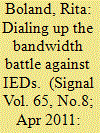

|
|
|
| 4 |
ID:
076112


|
|
|
| 5 |
ID:
107670
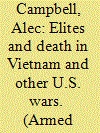

|
|
|
|
|
| Publication |
2011.
|
| Summary/Abstract |
Research on class bias in military service has focused on service and death among the economically disadvantaged during the Vietnam War. This study uses the war records of elite colleges to examine elite participation in five major wars. Significant differences in elite participation across wars are found, with lower rates during the Civil, Korean, and Vietnam Wars and higher rates during the World Wars. The similarities between Korea and Vietnam indicate that political unrest related to the Vietnam War was not the sole cause of low levels of elite participation. Changes in the size and structure of the post-World War II military are hypothesized as alternative causal factors.
|
|
|
|
|
|
|
|
|
|
|
|
|
|
|
|
| 6 |
ID:
124417
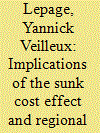

|
|
|
|
|
| Publication |
2013.
|
| Summary/Abstract |
Much of the literature on casualty sensitivity suggests that there is an inverse correlation between casualty levels and public support for war. It also suggests that a public will be more sensitive to local casualties. This article tests these pre-existing theses using data from Canada's participation in the war in southern Afghanistan between February 2006 and 2011. Studying the impact of both provincial and nationwide casualties, it finds no evidence to support these assumptions. Instead, this study finds strong indications that nationwide casualties led to a short-term increase in public support for the Afghan mission. This result is attributed to the sunk cost effect.
|
|
|
|
|
|
|
|
|
|
|
|
|
|
|
|
| 7 |
ID:
139838
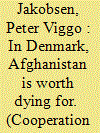

|
|
|
|
|
| Summary/Abstract |
Much to their own surprise, successive Danish governments have succeeded in maintaining the highest level of public support among the nations contributing to the NATO mission in Afghanistan, while suffering the highest number of fatalities per capita. We explain this puzzle in a parsimonious fashion manner using a novel analytical framework derived from elite-competition theory, the event-driven school and the literature on strategic narratives. The Danish government initially built strong political and popular support by making a case for war that resonated with broadly shared pre-existing interests and values (national defence and support for democracy and human/women’s rights), and role conceptions (supporting NATO and US-led military operations as a responsible member of international society). Succeeding governments subsequently maintained a high level of political consensus on Afghanistan through a process of continuous consultation and consensus-building. The political elites supporting the mission then sustained the high level of public support by defining success in ways that did not involve ‘winning’ but focused instead on the attainment of realistic short-term, tactical objectives such as police training and building of schools, and by speaking with one voice to the media. This effectively reduced the Danish media to a conveyor belt passively transmitting the positive views of the political parties supporting the Afghanistan operation and the officers and soldiers carrying it out.
|
|
|
|
|
|
|
|
|
|
|
|
|
|
|
|
| 8 |
ID:
139219
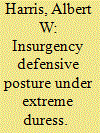

|
|
|
|
|
| Summary/Abstract |
Insurgent guerrilla groups are on occasion faced with difficult decisions: whether and when to become a conventional force, and whether to defend an operational base or fixed site. Standard doctrine suggests that to achieve state capture or acquire autonomous status apart from a central authority, the ability to successfully engage in conventional warfare may became necessary. A conventional force must be capable of defending territory, a defined space. Accompanying the decision to defend territory is a certain level of risk. This article examines the decision by four insurgent organizations to defend ‘operational hubs’, territory deemed worthy of a defense. The analysis herein submits that in insurgent warfare the utility of the territory being defended often supersedes the likelihood of a successful defense, on occasion generating negative outcomes for the insurgent forces.
|
|
|
|
|
|
|
|
|
|
|
|
|
|
|
|
| 9 |
ID:
129073
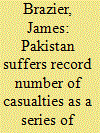

|
|
|
| 10 |
ID:
123142


|
|
|
|
|
| Publication |
2013.
|
| Summary/Abstract |
How does transnational terrorism affect the stability of parliamentary governments? Does terrorism cause some governments to fail prematurely and/or does it enhance the probability that some governments will stay in office longer than they otherwise would? Using a duration model on a sample of 18 advanced parliamentary democracies between the late-1960s and 2003, we find that terrorism exacerbates the likelihood of government failure for some governments but not others. Our principal finding is that right-oriented governments are able to keep their hold on power more than left-wing governments when confronted with transnational terrorism.
|
|
|
|
|
|
|
|
|
|
|
|
|
|
|
|
| 11 |
ID:
076111
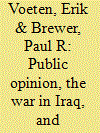

|
|
|
| 12 |
ID:
113752


|
|
|
|
|
| Publication |
2012.
|
| Summary/Abstract |
The "proximate casualties" hypothesis holds that popular support for American wars is undermined more by the deaths of American personnel from nearby areas than by the deaths of those from far away. However, no previous research has tested the mechanisms that might produce this effect. This omission contributes to three areas of lingering uncertainty within the war support literature: whether national or local losses have a greater effect on war support, whether the negative effects of war deaths are durable or temporary, and whether the negative effects of war deaths have a greater influence on the most or least attentive citizens. Analysis of Iraq War data shows that local losses have a greater effect on war support than national losses, that these casualty effects decay rapidly, and that citizens who closely follow news at the national and local levels are least affected by new information about war costs. These findings run contrary to the prevailing cost-benefit calculus model of war support.
|
|
|
|
|
|
|
|
|
|
|
|
|
|
|
|
|
|
|
|
|